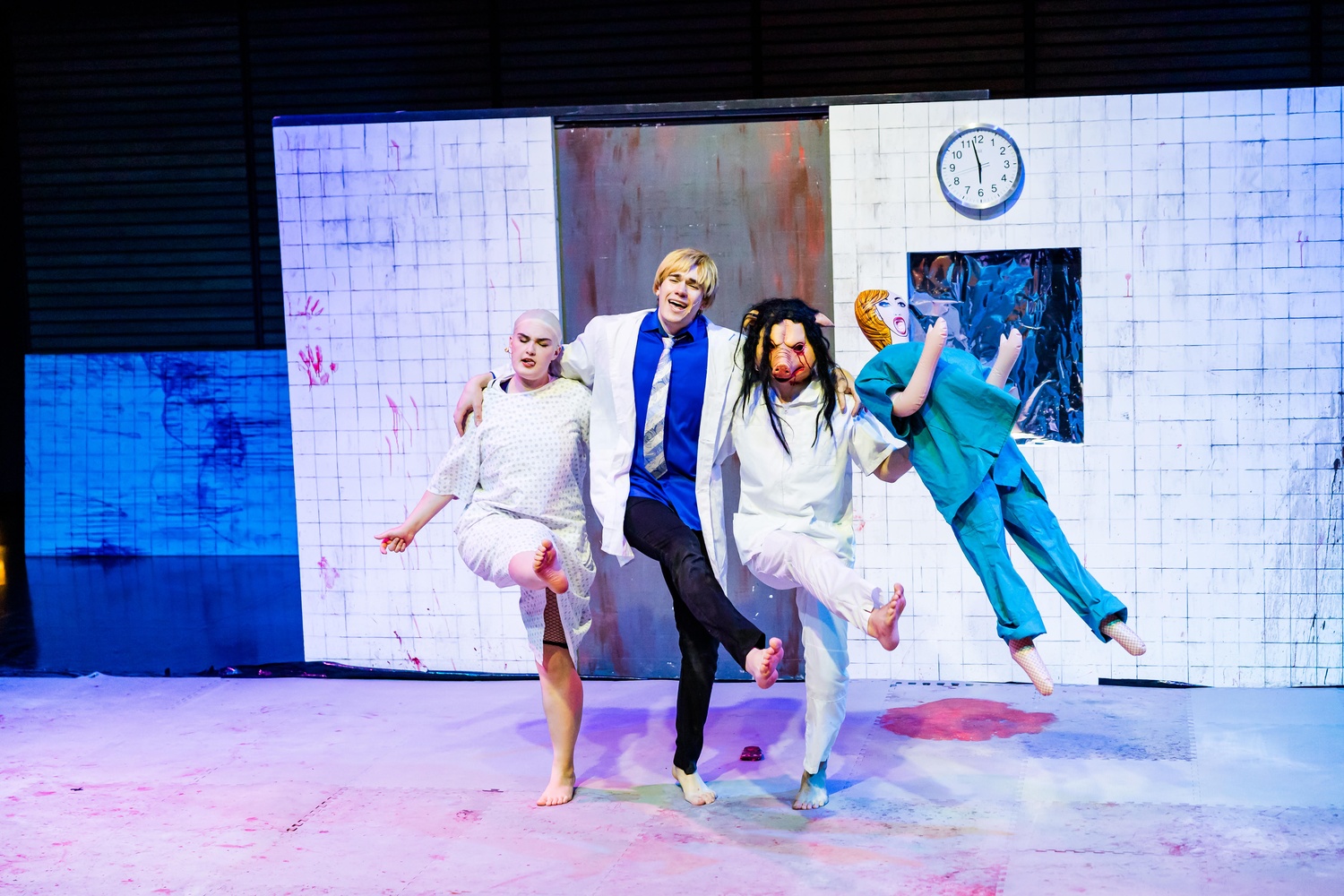
News
Summers Will Not Finish Semester of Teaching as Harvard Investigates Epstein Ties

News
Harvard College Students Report Favoring Divestment from Israel in HUA Survey

News
‘He Should Resign’: Harvard Undergrads Take Hard Line Against Summers Over Epstein Scandal

News
Harvard To Launch New Investigation Into Epstein’s Ties to Summers, Other University Affiliates

News
Harvard Students To Vote on Divestment From Israel in Inaugural HUA Election Survey
‘SAW The Musical’ Review: Where Horror Meets Humor

When thinking of the movie “Saw,” comedy is not the first thing that comes to mind. However, the parodic musical adaptation of one of the most thought-provoking and gut-wrenching horror films to this day speaks to the lead characters’ pop culture canonization, made completely wacky by their own unconventional love story.
“SAW The Musical” follows the film’s original plot, as photographer Adam Faulkner (James Lynch) and doctor Lawrence Gordon (Andrew Caira) find themselves chained across from each other in a bathroom. They are held captive there by the psychopathic John Kramer (Morgan Traud), otherwise known as Jigsaw.
However, creator and lead producer Cooper Jordan brought the horror home and truly made the musical a one-of-a-kind parody through the lead characters’ unserious and fun demeanors as they underwent life-or-death situations, giving the musical an incongruous feel and consistently drawing laughs.
Entering the theater of Watertown’s Mosesian Center for the Arts, one was greeted with a cozy black box that housed a set consisting of a tiled bathroom with a metal door, with everything in the vicinity worn-out and splattered with blood. The production dramatically reimagined the bathroom’s garishly fluorescent lights with blue and green lighting from two nontraditional stage lights on both sides of the black box.
The contrast between the eerily movie-accurate set design and the props’ wackiness contributed to the musical’s comedic tonal clash. For example, Jigsaw is simply a hand puppet controlled by a cloaked controller, and the absurdity of such a tiny object holding so much power over two grown men adds an element of eccentric humor to the production.
Moreover, a gay love story between Adam and “Larry” — as Adam lovingly calls Gordon — added an unexpected spin to the original story. The quirky and dramatized actions of the diva-esque Adam and the reasonable-turned-wild —and often dramatically flirty — Gordon brought to life and humanized the otherwise harrowing events of the original movie. Gordon even did the Debby Ryan smirk as he flirted with Adam — it doesn’t get any better than that.
The build-up of chemistry between the two leads began as they puzzled over the rules of the game they were stuck in, persisted through musical numbers about how they couldn’t fall for each other, and ended with both of them professing their undying love while brutally wounded from the game’s violent requirements.
The story was brought to life through the hard work of just three actors — Lynch, Caira, and Traud — who covered multiple roles each. The unique, contrasting personalities with which they presented each character testified not only to their versatile acting talents, but to the ingenious script.
Composer-lyricists Anthony De Angelis and Patrick Spencer along with choreographer Stephanie Rosenberg put the “musical” in the title with multiple original dance and song numbers that got the audience moving to the beat. However, after a while, the song numbers began to resemble one another, with all of them notably marked by a quirky beat and joyous tonality. Though the contrast between the grave lyrics and the songs’ upbeat vibes created a playful feeling, some varying songs like ballads or group chorales could have added even more entertainment value.
Nonetheless, the musical’s absurdity thrived with quirky songs on the topics of: Adam and Gordon falling for each other — and killing each other, Gordon cheating on his wife with a nurse —accompanied by a sensual dance with a sex doll, Adam erotically digging through a toilet to look for a clue while staring into Gordon’s eyes, and many more shenanigans.
Besides the music’s whimsy, the work of lighting designer Sheridan Glover facilitated transitions between flashbacks and current events. The theater blacked out during such transitions, while red lighting signaled Jigsaw’s presence. In serious scenes, the mysterious blue-green lighting took control — but quickly switched back to blank, fluorescent white lighting to punctuate wacky comments. Gordon’s shooting of Adam notably thrived from great technical design, as sound effects and dramatic lighting flashes as the bullet bounced from one wall to the other induced full immersion in the climactic scene.
The production team’s efforts to revolutionize “SAW The Musical” into a work of comedy beyond the confines of the original horror movie were hilarious, as evidenced by the show’s currently running national tour — a rarity for a parody musical. While staying true to the original movie’s chilling story, the musical taught unconventional love — all while eliciting some good laughs out of the reimagined trials of Adam and Gordon.
“SAW The Musical” ran at the Mosesian Center for the Arts from Oct. 12 to Oct. 13.
Want to keep up with breaking news? Subscribe to our email newsletter.
